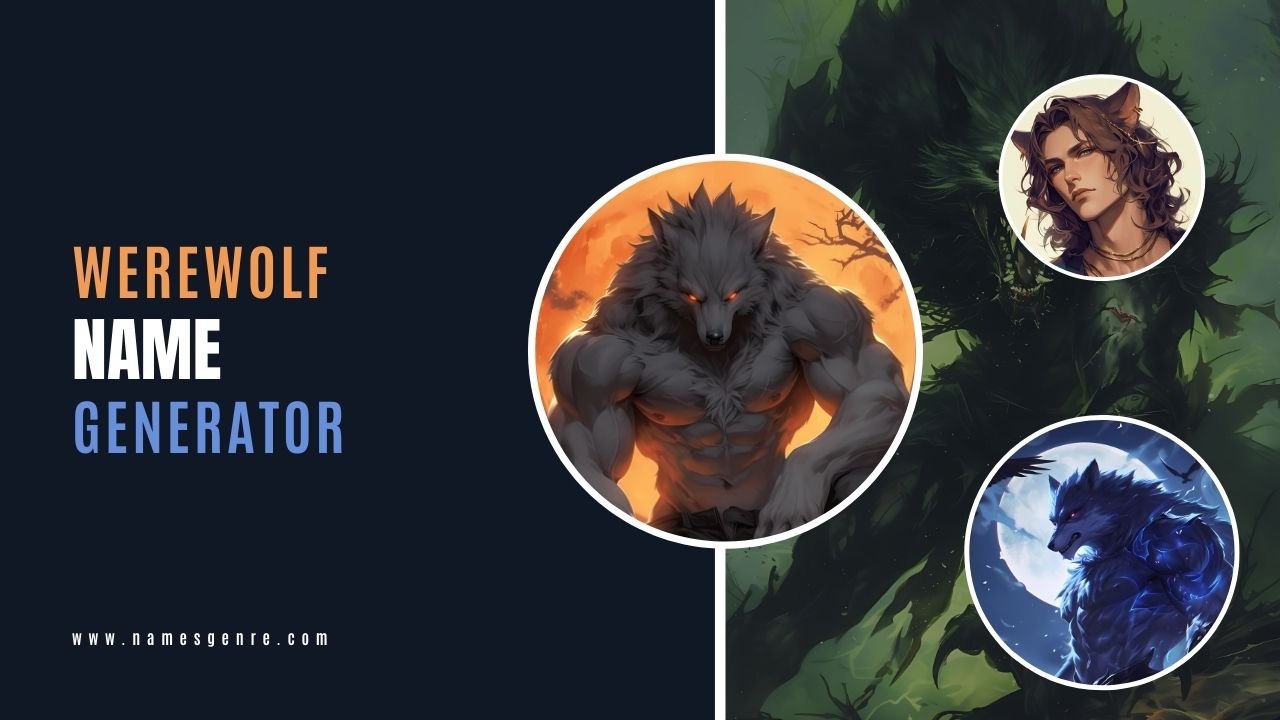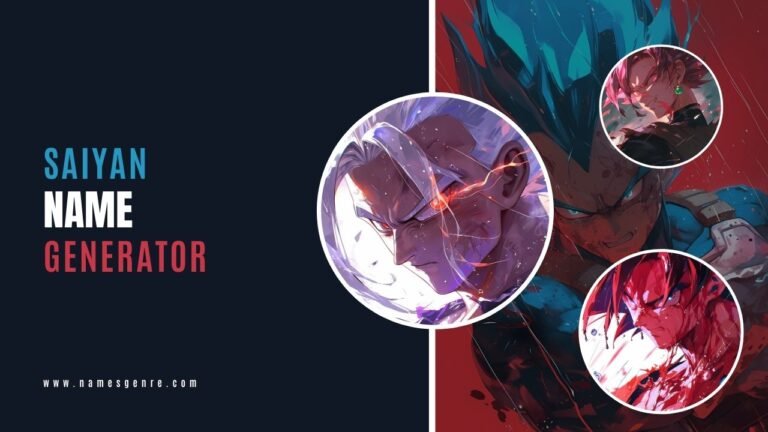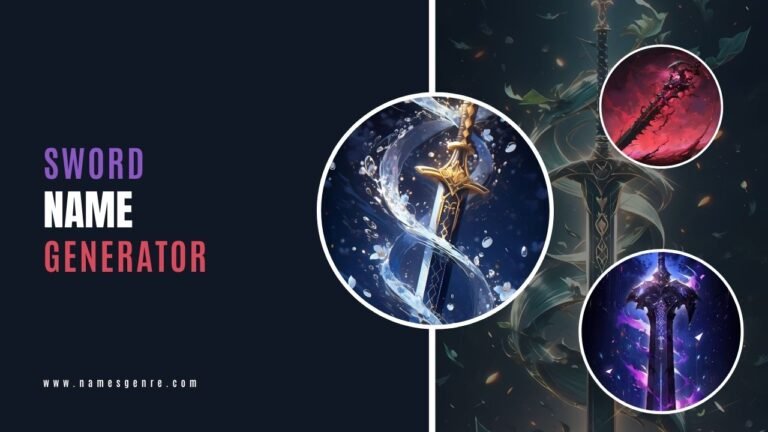Have you ever wondered what a fierce, dominant, and powerful name for a werewolf would sound like? Well, you don’t have to wonder anymore! In this article, I’ve introduced a tool that lets you explore countless werewolf names, along with their meanings and pronunciations. Whether you’re searching for the perfect name for your werewolf character or just curious, this tool has you covered!
By the way, there are many more things I can talk about when it comes to werewolves, as they are somewhat more special than any other fantasy creature you’ve seen in TV series or movies. They’re also one of the most popular ones as well… So, below are a few detailed points I’ve shared just for you to read.
If you have already explored the tool then you may also like our other tool that we created specially for vampire names so do check that out as well.
What are Werewolves?
Werewolves are typically humans who transform into wolves due to a magical curse or enchantment, often cast by a powerful witch or wizard. This transformation is usually triggered by specific conditions, such as the full moon or an encounter with another supernatural being.
Generally, the concept of werewolves exists in various cultures, but they are most commonly associated with European folklore. In these stories, a person is either cursed or infected (often by the bite of another werewolf) and can turn into a werewolf. The transformation can be painful or uncontrollable, and the werewolf often becomes stronger, faster, and more aggressive in its animal form.
In popular culture, werewolves are usually portrayed as dangerous predators, sometimes unable to control their actions when in their wolf form. However, some modern interpretations depict werewolves as tragic figures or creatures with complex moral dilemmas.
Origin:
It’s quite hard to pinpoint the exact origin of werewolves, as their stories have evolved over time based on rumors and beliefs. However, a few key facts remain consistent, such as the fact that werewolves have roots in ancient mythology, particularly in Greek and Roman tales.
If you ask me, then I am going to believe these tales until there is some pure evidence about them being fake. Coming back to the topic, my favorite myth about werewolves is the story of King Lycaon, who was transformed into a wolf by Zeus. (read the whole story here)
In medieval Europe, the belief in werewolves was linked to witchcraft and curses, often involving men turning into wolves through dark magic or pacts with the devil. While Norse mythology featured the úlfheðnar, warriors who wore wolf pelts and took on wolf-like traits.
Surprisingly, the modern image of the werewolf—transforming during a full moon—was popularized in literature and film, particularly in the 19th and 20th centuries. Some psychological theories also suggest that lycanthropy may have stemmed from mental conditions like delusions or rabies.
Appearance:
Just like a predator, after becoming a werewolf, a male or female becomes more dominant and fierce in nature. They can often express anger more intensely than before, reflecting their supernatural abilities that altered their real personalities. In addition to these traits, werewolves often become more masculine and attractive, making it easier for others to fall for them. Females, in particular, tend to become more alluring as well.
Now that you know about their human appearance, let me tell you about their wolf-like form. They go through a painful transformation, becoming full-fledged massive wolves while their eyes often glow with a fierce, unnatural color.
Ability:
The primary ability of a werewolf is the transformation from human to wolf, which is often triggered by the full moon. In their wolf form, werewolves gain enhanced physical strength, speed, heightened senses, and increased aggression. They may also struggle with controlling their actions during the transformation, causing harm to even their loved ones without knowing.
Over time, they began to control their wolf form and found ways to use their supernatural powers more efficiently, without hurting themselves or their loved ones. However, before they learn to control it, they all have to go through a painful transformation every full moon.
How to create Werewolf names?
Creating a werewolf name is easier than you might think. After all, you have to simply combine primal, mystical, and cultural elements to reflect their feral and supernatural nature. You can also consider their origin, personality, and role within the pack, or draw inspiration from cultural roots like Norse or Celtic mythology. For example, names such as “Fenrir” or “Faolan” can work well.
Traits like nobility or savagery can also inspire names like “Duskbane” or “Nightfang.” Alternatively, you can also use primal elements like “Fang” or “Howl,” or mystical themes such as “Lunaris” or “Astrumshade.” Titles like “Alpha Shadow” or “Lone Howl” can emphasize their role in the pack. By blending these ideas, you can create a unique name that perfectly captures their essence.
Best Werewolf names
| Name | Meaning | Origin | Gender |
|---|---|---|---|
| Fenrir | Giant wolf from Norse myth | Norse | Male |
| Lycaon | Wolf king of Arcadia | Greek | Male |
| Kaela | Keeper of the forest | Gaelic | Female |
| Theron | Hunter | Greek | Male |
| Lupa | She-wolf | Latin | Female |
| Varg | Wolf | Old Norse | Male |
| Aulona | Moonlight | Albanian | Female |
| Amarok | Giant wolf spirit | Inuit | Male |
| Zev | Wolf | Hebrew | Male |
| Cailean | Young warrior | Scottish | Male |
| Eira | Snow | Welsh | Female |
| Rurik | Famous wolf | Slavic | Male |
| Lunaire | Of the moon | French | Female |
| Arvid | Eagle-wolf | Scandinavian | Male |
| Lyssa | Wolf-like | Greek | Female |
| Faelan | Little wolf | Irish | Male |
| Circea | Enchantress of wolves | Greek | Female |
| Skoll | Chaser of the sun | Norse | Male |
| Velkan | Wolf prince | Romanian | Male |
| Seren | Star-like | Welsh | Female |
| Niall | Champion | Irish | Male |
| Tala | Wolf | Native American | Female |
| Bjorn | Bear-like | Swedish | Male |
| Maia | Brave and powerful | Greek | Female |
| Gunnar | Battle warrior | Norse | Male |





